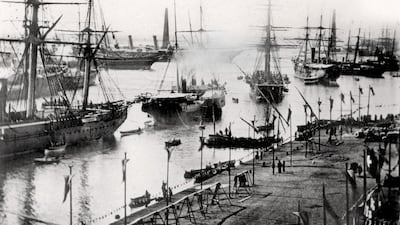On Thursday, August 6, Egypt will pull out all the stops to celebrate the opening of a new 72-kilometre channel parallel to the Suez Canal which, for the first time, will allow ships to transit the waterway in both directions simultaneously, chopping the journey to 11 hours from the current 22.
Egypt hopes this will more than double the canal’s revenue in eight years and attract more business to the industrial and logistics corridor being built along its shores.
But the ceremony comes fraught with symbolism, and the government has been treading a careful line between marking an important national achievement and evoking memories of the disastrous events that followed the canal’s original opening in 1869. Within 13 years of the first opening, the government was bankrupt, its ruler had been deposed and, finally, a foreign army invaded and conquered the nation.
Most of the details of the August inauguration are still under wraps, but a few have become public. Some 3,000 to 4,000 guests will be invited for a grand ceremony atop a bluff not far from Ismailia, where the main festivities took place in 1869.
An imposing dais has been built on the bluff which overlooks the new channel, and the president, Abdel Fattah El Sisi, will attend the gala ceremony, which will last one day. The government, which has hired the British public relations company WPP to organise the event, has been sending out invitations to world leaders and to about 200 celebrities from Egypt and around the world. A flotilla of ships is expected to pass through the new channel to mark the occasion, and almost certainly there will be a spectacular fireworks display.
Apart from that, the government is providing few other details.
“I do know the details, but I really can’t say,” says Edmond Moutran, of Memac Ogilvy, part of the organising group led by WPP. Singing, dancing? “Yes, something like that.”
Still, the government has been keen to disassociate itself from the over-the-top extravagance of the original opening. It says it will not put up a single penny for the festivities, which will instead be financed by private companies.
The 1869 ceremonies were said to have cost Egypt 2 million pounds sterling, worth billions of dollars in today’s prices.
The ruler of Egypt, Khedive Ismail, was flush with cash after southern ports in the United States were blockaded in the Civil War, causing the price of Egyptian cotton to soar on world markets, and he used the money for a series of mega-projects.
To impress the world leaders he planned to invite, he ordered the fast-track construction in Cairo of a new European-style district, now called downtown, in the two years leading up to the canal’s opening.
In early 1869 he ordered the construction of an opera house modelled on Milan’s La Scala, then commissioned the Italian composer Verdi to write an opera to mark the inauguration. The opera house was built in six months, but the opera, Aida, was delayed, so Rigoletto was performed instead.
Ismail had the Gezira Palace, now the Marriott hotel in Zamalek, especially built for Eugénie, wife of Napoleon III, during her stay in Egypt.
He toured European capitals to invite some 1,000 guests, all expenses paid.
Cairo was illuminated with gas lights, and fireworks were sent up from rafts on the Nile. At least eight palaces were set aside for the guests.
Ismail then set sail to Port Said, followed by Prince Henry of Holland, who arrived on November 13.
Franz-Josef, emperor of Austria, arrived at the port to a roar of artillery on November 15 aboard his yacht, escorted by a war frigate. He was followed by Crown Prince Frederick of Prussia, Prince Ernest-Auguste of Hanover, Emir Abdel-Qadar of Algeria, and the Russian and British ambassadors to Istanbul, General Nicolai Ignatieff and Sir Henry Elliot.
Some 160 vessels gathered, welcomed by cannons, rockets and fireworks.
On the morning of November 18, a procession of 67 vessels, headed by empress Eugénie’s yacht L’Aigle, with Eugénie and the canal’s developer, Ferdinand de Lesseps, on board, filed into the canal towards Ismailia, where the main festivities were held.
Ismail Pasha brought in 500 chefs and helpers from Trieste, Genoa, Livorno and Marseille, and 7,000 or 8,000 people were served that evening at his newly constructed Ismailia palace under a peristyle hung with gold cloth and decorated with hothouse flowers and exotic plants.
The French artist Eugène Fromentin wrote that fireworks were let off in front of the palace and “luxurious dinners, vintage wines, exquisite fish, partridge, wild duck” were served. Dancers, jugglers and singers performed to deafening music of fifes and drums.
The flotilla finally reached Suez on November 20.
This and a series of other extravagant projects that Ismail Pasha financed with huge loans from European creditors eventually bankrupted the government. These included expansion of the country’s canal system and military adventures that for a time made Egypt the biggest empire in Africa.
In 1879, European powers forced his exile to Istanbul, and in 1882 a British force, which landed in Ismailia itself, invaded, seizing control of the country for the next seven decades.
The government this time around made sure the $8 billion canal project was financed entirely by Egyptians to avoid even an echo of the 1869 ceremony.
Patrick Werr has worked as a financial writer in Egypt for 25 years
business@thenational.ae
Follow The National's Business section on Twitter

